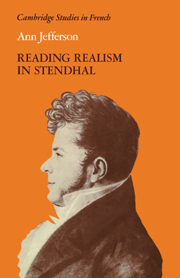Book contents
- Frontmatter
- Contents
- Preface
- PART ONE Introduction
- PART TWO De l'Amour
- PART THREE Le Rouge et le Noir
- PART FOUR Vie de Henry Brulard
- PART FIVE La Chartreuse de Parme
- 7 The representation of politics and the politics of representation
- 8 A hero without qualities
- 9 Forgery, plagiarism and the operatic text
- Conclusion
- Notes
- Bibliography
- Index
- Cambridge Studies in French
8 - A hero without qualities
Published online by Cambridge University Press: 05 February 2012
- Frontmatter
- Contents
- Preface
- PART ONE Introduction
- PART TWO De l'Amour
- PART THREE Le Rouge et le Noir
- PART FOUR Vie de Henry Brulard
- PART FIVE La Chartreuse de Parme
- 7 The representation of politics and the politics of representation
- 8 A hero without qualities
- 9 Forgery, plagiarism and the operatic text
- Conclusion
- Notes
- Bibliography
- Index
- Cambridge Studies in French
Summary
L'auteur pense que, excepté pour la passion du héros, un roman doit être un miroir.
Stendhal, Lucien LeuwenCharacter degree zero
Fabrice is unlike Stendhal's other heroes, and indeed unlike the heroes of most realist fiction in that he has no errors to correct, no ideals to revise. He needs no Bildung, no education, sentimental or social, since he is born perfect and dies exemplary. Whereas Julien spends most of his short life energetically pursuing false ambitions and in a state of delusion about the path that will lead to happiness, Fabrice never has to be put right. This perfection makes him a most unusual fictional hero, and La Chartreuse a most unusual novel. But what makes both hero and novel decidedly peculiar is the fact that, although Fabrice is undeniably perfect, it is almost impossible to say what that perfection consists of. In short, he seems to constitute something of an anomaly in the nineteenth-century novel: a hero without qualities, undeniably a hero, but lacking in the characterfulness that is normally thought of as essential to the genre.
In the last chapter I tried to show that the most valuable and important aspects of the novel – its central characters and situations – eluded the grasp of the majority of the politically ambitious (as opposed to politically inspired) characters in the book, and that their vain ambitions involved them in a constant misrepresentation of the characters and motives of Mosca, Gina and Fabrice. But the reader, who has nothing to gain from such vilifications, is nevertheless liable to find that Fabrice consistently and most perplexingly continues to elude her grasp.
- Type
- Chapter
- Information
- Reading Realism in Stendhal , pp. 181 - 200Publisher: Cambridge University PressPrint publication year: 1988

